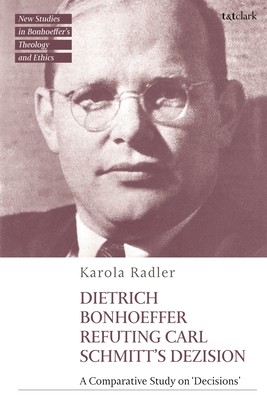
- We will send in 10–14 business days.
- Author: Karola Radler
- Publisher: T&T Clark
- ISBN-10: 0567714594
- ISBN-13: 9780567714596
- Format: 15.6 x 23.4 x 1.4 cm, kieti viršeliai
- Language: English
- SAVE -10% with code: EXTRA
Dietrich Bonhoeffer Refuting Carl Schmitt's Dezision (e-book) (used book) | bookbook.eu
Reviews
Description
Radler examines Bonhoeffer's and Schmitt's intellectual paradigms of thought of theology and jurisprudence. Whilst both thinkers encounter constitutional institutional models, they arrive at opposing conclusions and actions. This book tackles how they approach the indicators for a decision of choices between alternatives, the urgency of resolving the problems at hand, the intended goal, and the following active manifestation.
Radler reveals how Schmitt's form of Dezision, resting on a linear model of history, abstracts metaphysical content from objective normative evaluation and, in support of a human personality representing the idea of Christ, elevates the significance of the self over content and subject in structural analogy to theological dogma. On the other hand, Bonhoeffer's theology repudiates Schmitt's political-jurisprudential position, contesting that history ultimately focuses on leading to human wholeness through reconciliation.EXTRA 10 % discount with code: EXTRA
The promotion ends in 23d.17:39:24
The discount code is valid when purchasing from 10 €. Discounts do not stack.
- Author: Karola Radler
- Publisher: T&T Clark
- ISBN-10: 0567714594
- ISBN-13: 9780567714596
- Format: 15.6 x 23.4 x 1.4 cm, kieti viršeliai
- Language: English English
Radler examines Bonhoeffer's and Schmitt's intellectual paradigms of thought of theology and jurisprudence. Whilst both thinkers encounter constitutional institutional models, they arrive at opposing conclusions and actions. This book tackles how they approach the indicators for a decision of choices between alternatives, the urgency of resolving the problems at hand, the intended goal, and the following active manifestation.
Radler reveals how Schmitt's form of Dezision, resting on a linear model of history, abstracts metaphysical content from objective normative evaluation and, in support of a human personality representing the idea of Christ, elevates the significance of the self over content and subject in structural analogy to theological dogma. On the other hand, Bonhoeffer's theology repudiates Schmitt's political-jurisprudential position, contesting that history ultimately focuses on leading to human wholeness through reconciliation.

Reviews